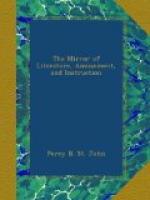“I see no hope but in yourself. Do you think my father will give up his life’s hatred to the name of Aldobrandini, because his son loves one of its daughters, and wears a sad brow for a forbidden bride? or, think you, that yonder stern cardinal will give up the plans and power of many years, and yield to a haughty and hereditary foe, for the sake of tears even in thy eyes, Giulietta?”
“I know not what I hope,” replied the maiden, in a mournful, but firm voice; “but this I know, I will not fly in disobedience and in secrecy from a home which has been even as my own.”
“And what,” exclaimed the cavalier, “can you find to love in your severe and repelling uncle?”
“Not severe, not repelling, to me. I once thought him so; but it was only to feel the more the kindness which changed his very nature towards us. My uncle resembles the impression produced on me by his palace: when I first entered, the stillness, the time-worn hangings, the huge, dark rooms, chilled my very heart. We went from these old gloomy apartments to those destined for us, so light, so cheerful, where every care had been bestowed, every luxury lavished; and I said within myself, ’My uncle must love us, or he would never be thus anxious for our pleasure.’”
A few moments more and their brief conference was over. But they parted to meet again; and at length Giulietta fled to be the bride of Lorenzo da Carrara. But she fled with a sad heart and tearful eyes; and when, after her marriage, every prayer for pardon was rejected by the cardinal, Giulietta wept as if such sorrow had not been foreseen. Her uncle felt her flight most bitterly. He had watched his favourite niece, if not with tenderness of look and tone, yet with deep tenderness of heart. When her elder sisters married and left his roof, he missed them not: but now it was a sweet music that had suddenly ceased, a soft light that had vanished. The only flower that, during his severe existence, he had permitted himself to cherish, had passed away even from the hand that sheltered it. It was an illusion fresh from his youth: his love for the mother had revived in a gentler and holier form for her child, and now that, too, must perish. He felt as if punished for a weakness; and all Giulietta’s supplications were rejected: for pride made his anger seem principle. “I have been once deceived,” said he; “it will be my own fault if I am deceived again.”
Yet how tenderly was his kindness remembered, how bitterly was his indignation deplored, by the youthful Countess da Carrara!—for such she now was—Lorenzo’s father having died suddenly, soon after their union. The period of mourning was a relief; for bridal pomp and gaiety would have seemed too like a mockery, while thus unforgiven and unblessed by one who had been as a father in his care. At her earnest wish they fixed their first residence in the marine villa where her mother died.
“And shall you not be sad, my Giulietta?” asked her husband. “Methinks the memory of the dead is but a mournful welcome to our home.”




